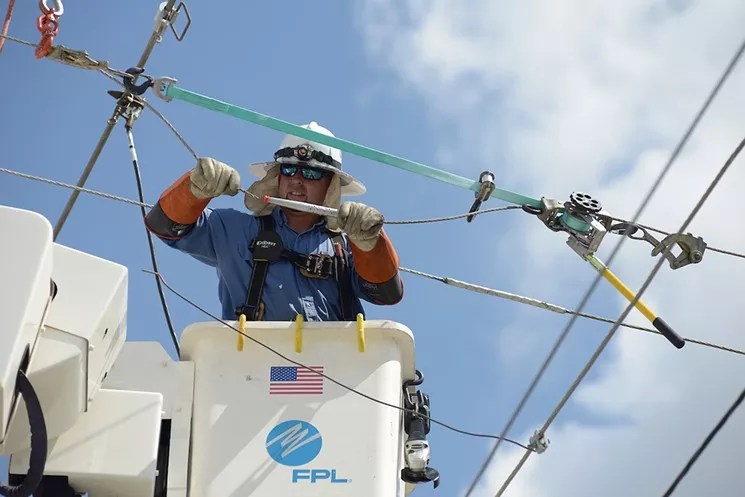
Photo by Florida Power & Light

Audio By Carbonatix
Florida Power & Light (FPL) customers in the Miami area seem split on the idea of an 11.9 percent rate increase on their power bills beginning in 2026.
Residents opposing the rate increase at a Hollywood hearing appeared to be in the minority, as several business owners and other residents spoke highly of FPL and threw their support behind the rate increase. Officials from the Florida Public Service Commission (PSC) hosted the meeting, which, like previous hearings on the rate proposal, lasted more than two hours, to gauge Floridians’ feelings on the proposed rate hike.
Opponents argue the rate hike, which would amount to more than $10 billion for FPL, is unnecessary and will make Florida living more unaffordable, according to Solar United Neighbors, a nonprofit focused on energy issues. It would be the largest energy rate hike request in the history of the United States, according to the nonprofit.
“If the Florida Public Service Commission approves FPL’s request, you could pay at least $200 more annually for electricity by 2027, and potentially hundreds more,” according to the nonprofit. “FPL’s executives are making record salaries while Floridians cut back on A/C in the dead of summer to afford their bills.”
A few South Florida residents who attended the Hollywood meeting on Thursday agreed. One man told commissioners the rate hike would force him into choosing between his $400 monthly medication and paying his power bill.
“You’re affecting my livelihood, you’re affecting my family,” he said at the hearing. “I may have to leave because I can no longer afford to live here because of things like this.”
Another woman agreed with his dissent, saying this doesn’t include other fees the company could tack on in the coming years.
“I mean, seriously?” she said at the hearing. “We’re faced with so many other rising costs, and you’re going to hit us with this?”
The first person to speak in favor of the rate increase argued that FPL needs to increase rates to offer better technology to its customers.
That’s when Jordan Luebkemann, an attorney from EarthJustice, a nonprofit legal team focused on environmental law, began to call out speakers with ties to FPL. Luebkemann was a member of the Florida Public Service Commission’s panel and helped run the hearing.
Luebkemann pointed out that the woman who spoke was previously employed by another power company.
Several South Florida residents seemed to echo her comments, saying they had nothing but good things to say about the company. Most of them readily admitted to the crowd that FPL had asked them to come speak on its behalf; the group seemed to outnumber all other speakers on Thursday.
A Pompano Beach high school teacher speaking on behalf of the Greater Pompano Chamber of Commerce told the crowd he wasn’t for or against the proposal to increase rates, but said he did understand there’s a price to pay for advanced technology
Luebkemann pointed out that FPL financially supports the chamber.
One of the few to speak in favor of the increase and not draw some rebuke from Luebkemann was Sam Goodman, a South Florida landscape business owner.
“When prices go up on me, I have to pass it onto the customer,” he says. “We can’t expect to have the same service from five years ago and expect to pay the same thing now. I understand that healthy service means rate increases.”
Former State Senator Perry Thurston, a lifelong Broward County resident, was also in attendance. He noted FPL has always responded swiftly to storm-related outages when he called on them while in office between 2020 and 2022, but that doesn’t mean residents will accept a rate increase.
“I haven’t polled anyone, but I know this rate increase won’t be popular among those in my community, I can tell you that right now,” he said.
The commission will host three virtual hearings on the matter on June 3 and 4.
Testimony at the hearings will be considered evidence in the rate case and will help the commission determine whether to vote for FPL’s proposal, according to nonprofit Food & Water Watch.
“For too long, DeSantis’ PSC has been a rubber-stamp for corporate utility handouts – Florida families are footing the bill,” Food & Water Watch senior Florida organizer Brooke Ward said in a statement. “Unchecked rates must end now. The PSC must champion the 12 million people who get their electricity from FPL by rejecting FPL’s greedy request.”
Ward organized a letter opposing the rate hike and garnered the support of 30 Florida nonprofits, including Florida Council of Churches, Central Florida Jobs with Justice, Climate Reality Project, Earth Ethics, ReThink Energy Florida, and Conservatives for Responsible Stewardship.